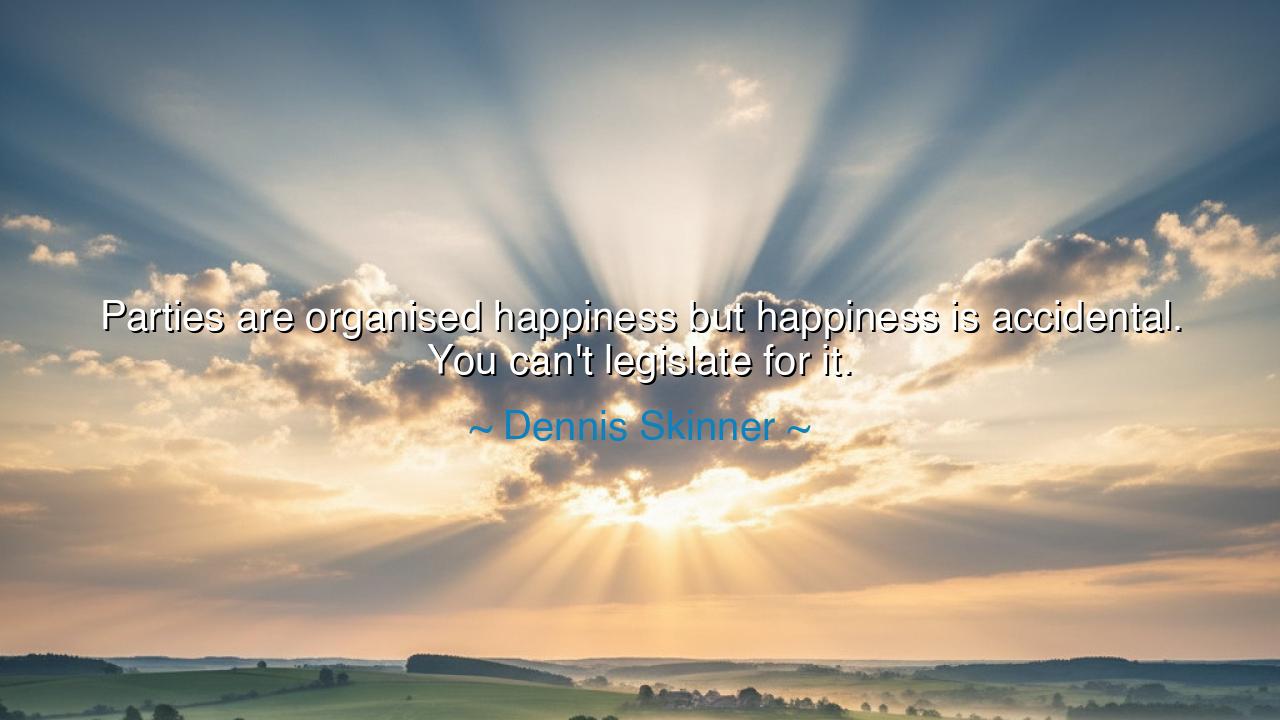
Parties are organised happiness but happiness is accidental. You
Parties are organised happiness but happiness is accidental. You can't legislate for it.






Listen well, O seekers of truth and joy, and mark the wisdom in the words of Dennis Skinner, the fiery “Beast of Bolsover,” who once declared: “Parties are organised happiness, but happiness is accidental. You can’t legislate for it.” Though he spoke from the chambers of politics, his words echo far beyond the halls of Parliament — for they touch upon the nature of joy itself, and the folly of trying to command it. In this saying, there lies an eternal truth: that while men may gather to celebrate, may design their festivals and their revelries, happiness itself remains wild, ungoverned, and free.
The ancients would have understood this well. They knew that joy cannot be summoned like a servant or written into law like a decree. The Greeks raised temples to Dionysus, god of wine and ecstasy, yet even they knew that his spirit could not be contained by ritual alone. Happiness, said Aristotle, is the byproduct of virtue, not the object of pursuit. It arises unexpectedly — in the laughter of a friend, in the warmth of the sun, in the quiet satisfaction of a task well done. To plan for it too carefully is to frighten it away, for happiness is like a bird that lands upon the open hand but flees the clenched fist.
When Dennis Skinner spoke of parties as “organised happiness,” he spoke with irony and insight. A party — whether political or social — is an attempt by human beings to craft joy out of structure. But happiness, being accidental, belongs to the realm of the heart, not the agenda. The feast may be set, the music may play, yet true joy may visit or not, for it answers to no summons. Even the grandest celebration can feel empty if the soul is unready. And sometimes, the smallest, quietest moment — a shared smile, a memory stirred by music — can bring the deepest joy.
Consider, for example, the fall of the Berlin Wall in 1989. It was not planned as a festival, not scripted or scheduled. Yet when the concrete barrier crumbled and strangers embraced atop its ruins, the world witnessed a spontaneous eruption of happiness. No government could have legislated such a moment; no order could have produced it. It was the natural flowering of human spirit freed from fear. This is what Skinner meant: that joy comes not from structure or design, but from freedom — the freedom to feel, to hope, to connect.
And yet, how often do we seek to organize happiness — to plan our joy as though it were a duty? We chase it in gatherings, possessions, entertainments, thinking that by effort we can trap it like light in a jar. But happiness, like sunlight, cannot be owned; it must be experienced. The wise understand that joy is not built but discovered, not commanded but invited. When we stop striving to control it, we find it waiting quietly within us, as steady and ancient as the heartbeat of the earth.
There is a paradox here: though happiness is accidental, we can prepare ourselves for its arrival. Just as a field cannot command rain but can be tilled and ready to receive it, so too can the heart be open to joy. Cultivate gratitude, compassion, and presence, and you will find that happiness visits you more often. But do not demand it — for demand turns sweetness into bitterness, and expectation into disappointment. Live fully, work honestly, love fiercely, and let joy find you where it will.
Thus, the teaching of Skinner’s words is this: beware the illusion that life’s deepest pleasures can be planned or promised. No law, no institution, no party, can grant true happiness. It is the sovereign right of the soul, arising when life and spirit align in truth. To seek it directly is to lose it; to live rightly is to receive it.
So, my children of the turning world, do not chase happiness like a fugitive dream. Build a life of meaning, of courage, of sincerity — and let joy come to you as it once came to the poets, unbidden yet eternal. Remember always: you can organize a feast, but not delight; you can plan a party, but not the laughter that fills it. Happiness is the gift of the moment — and the moment, once honored, becomes forever.






AAdministratorAdministrator
Welcome, honored guests. Please leave a comment, we will respond soon